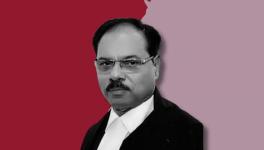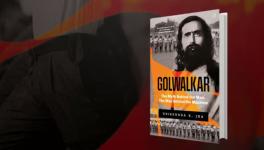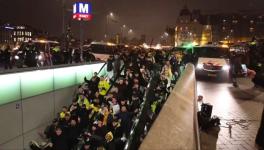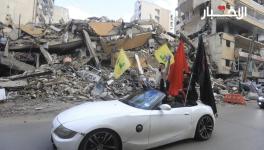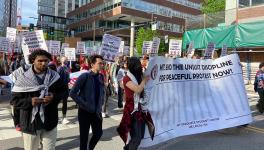COVID-19 in Palestine: Solidarity and Steadfastness Amid Multiple Crises
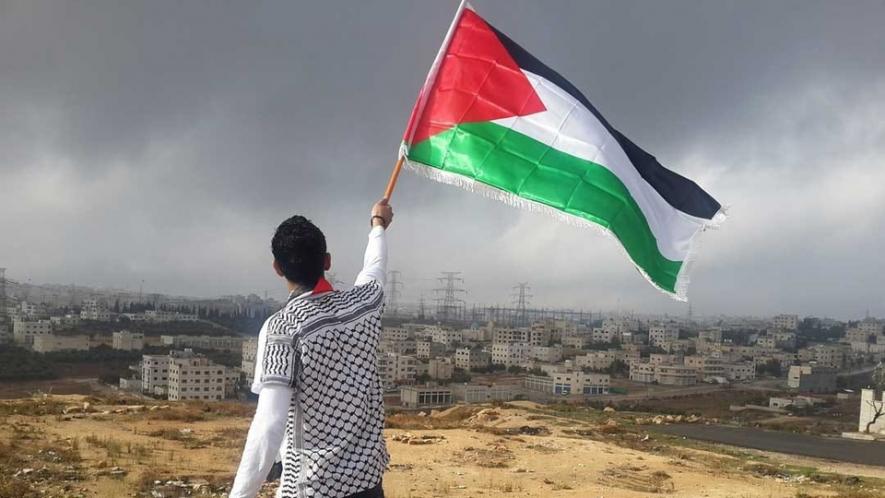
Photo: WFTU
On March 30, amid the COVID-19 outbreak, Palestinians commemorated the 44th Land Day and the 2nd anniversary of the Great March of Return, two significant milestones in the history of their resistance to Israeli occupation. Due to restrictions put in place as part of the pandemic, the commemoration took place in the virtual world via Twitter storms and ‘online rallies.
The outbreak, however, has also laid bare the impact of Israeli repression, apartheid, and blockade on Palestinian healthcare. The region currently faces an acute shortage of basic infrastructural facilities and protection equipment required to tackle the spread of COVID-19, including ICU beds, ventilators, medicines, and protective gear. The Israeli administration, which is “legally” responsible for Palestinians’ healthcare, has turned a blind eye to the catastrophe caused by its own actions. This is besides the abuse inflicted upon the inhabitants of this region in the form of police violence and discriminatory quarantine policies.
In this interview, Mukulika R of the Indian Cultural Forum speaks to activist Maren Mantovani about the current situation in Palestine, the unity and solidarity of the Palestinians amid all the chaos, Israel’s attempts to influence the Hindi film industry, COVID-19 in the Global South, and more.
Mukulika R (MR): It is understood from multiple news reports that Palestinians are staring at an acute shortage of ICU beds, testing kits, ventilators and other medical facilities. It is also clear that the Israel-Egypt blockade, which limits the supply of such items to the Palestinian territory, has only added pressure. In fact, the healthcare crisis in Palestine, as we understand, has a long history of injustice and absolute discrimination. This is of course besides the lack of regular electricity and fuel supply. Could you elaborate on this and also tell us how Palestinians are fighting COVID-19 amid the apartheid? How has life been in the occupied territory since the outbreak?
Maren Mantovani (MM): The COVID-19 pandemic is bringing into the open Israel’s racist and inhumane policies more than ever and has become a model for “corona-racism”. The pre-existing structure of colonial oppression evidently influences the way Palestinians are made to experience the pandemic. Apart from the majority of Palestinians that are today refugees, many of whom are not living in Palestine anymore, those that have been able to remain in their homeland are affected in different ways by the outbreak of COVID-19.
Due to the ongoing inhumane siege and the repeated massacres that have reduced the tiny occupied Gaza Strip into shambles without possibilities for reconstruction or construction of efficient infrastructure and services, Palestinians there are left without access to medical equipment, have run out of test kits and experience a severe lack of ICU beds. In the occupied West Bank, the major threat at the moment is that Israel is taking advantage of the lockdown to dramatically escalate its brutal attacks on Palestinians, with almost daily killings and arrests, and to rapidly advance its policies of annexation, land grab and expulsion of the Palestinian people in order to implement the plan presented by the Trump administration in the so-called ‘Deal of the Century’ — the full ghettoization of the Palestinian people in tiny enclaves. Settler attacks are on the rise. Home demolitions continue even at a time when people are supposed to be quarantined at home. Even a health clinic in the Jordan Valley has been destroyed. Palestinians today are in a devastating situation where they have to choose between adhering to prevention measures to safeguard themselves from COVID-19, or to continue, against all odds, collective popular resistance. Either way, they risk their lives.
Israel’s corona-racism is also visible in their treatment of Palestinian workers. While Israeli workers have been asked to stay at home for weeks, some 55,000 Palestinian workers have been forced not to go home but to stay for at least a month at their workplace in mostly absolutely inhumane conditions, with no access to basic hygiene or protective gear. They act as the cheap and dispensable workforce to keep the Israeli economy afloat. In cases they are suspected to have contracted COVID-19, they are often driven to the West Bank and literally dumped on the other side of the military checkpoints.
MR: Ever since the virus broke out, there have been protests and demands in several countries to release their prisoners due to overcrowding and other miserable conditions in jails. Recently, novelist-activist Ahdaf Soueif and others, who were demanding the release of Egypt’s political prisoners in a bid to curb the risk of the spread of the virus inside prisons, were detained in Cairo. In Gaza too, human rights groups have been asking for the same from the Israeli administration, especially after it was alleged that a 19-year-old from Beitunia had recently contracted COVID-19 in prison. How has the government’s response been in this regard? How important is this issue and what is the condition of Palestinian prisoners in Israeli jails?
MM: The demand for the release of the Palestinian prisoners and the concern about their (at least relative) well-being is always fundamental. Not only does practically every Palestinian family have a loved one in prison or someone who has experienced prison, the liberation of prisoners has always been been at the core of national liberation struggles.
COVID-19 has drastically worsened the situation of prisoners. They now are threatened not only by their jailers, but by the risk of contracting the virus as well. Detention conditions include insects, humidity, lack of proper ventilation, overcrowding, lack of measures to ensure public and personal hygiene, and lack of proper needed nutrition, all of which make Israeli prisons dangerous breeding grounds for COVID-19 and definitely compound the vulnerability of Palestinian prisoners.
The Israeli occupation authorities have excluded 5,000 Palestinian prisoners from emergency measures to contain and mitigate the pandemic. The Israeli prison administration has decided to cut the supply of sanitizers and other hygienic materials for canteens selling products to prisoners. Further, under the pretext of the COVID-19 pandemic, all family and lawyers’ visits have also been suspended. Now, more than ever, is when Palestinian prisoners need to be released.
MR: Police atrocities have only risen in many quarantine-imposed regions of the world. In India, there have been multiple incidents of attacks by the police on commoners. A number of videos have surfaced of health workers in Kashmir being roughed up by paramilitary troops for working during quarantine hours; a man was killed in West Bengal due to alleged attacks by the police. News reports on Palestinians being attacked by Israeli police under the garb of COVID-19 restrictions have also come out. In this respect, could you elaborate how the outbreak and government regulations imposed as part of it are affecting Palestinians living under occupation?
MM: Israel continues to arrest and attack Palestinians not because of COVID-19, but for being Palestinians. Military raids continue despite the pandemic. Palestinians continue to be killed while settler attacks increase. The recent arrest of the Palestinian governor of Jerusalem was motivated even officially by the fact that he engaged in “political activity.”
One of the most worrisome elements of Israel’s repression, however, is the expansion of its hi-tech surveillance regime. Israel has long used the Palestinian people as a laboratory for all sorts of surveillance technology, which then is marketed globally as “field-tested”. This ranges from drones to facial recognition technology and many forms of spyware. During this pandemic, Israel has been involving its feared Shin Beit, the military intelligence agency, in large scale tracking of people, apparently to prevent the spread of the virus. Israel’s minister of defense aims at rating every citizen with an infection probability between 1 and 10, using the technology of the NSO Group. The Israeli cyber tech company has become globally known for their hacking and spying malware Pegasus, which has been used against human rights defenders and journalists in India. Among others, Pegasus has helped in the killing of Jamal Kashoggi in the Turkish embassy in 2018.
While there is no proof available that mass surveillance and spy operations can curb pandemics, COVID-19 shows that pandemics can silence legitimate calls for privacy protection and respect for human rights. As governments and corporations are using the pandemic to legitimize its repressive paradigms and methods, Israel is at the forefront of this move.
MR: Indian Prime Minister Narendra Modi’s friendship with Benjamin Netanyahu is well known. In the midst of the pandemic, the Indian government has signed a deal with Israel for the purchase of weaponry worth millions of dollars, laying bare their priorities even in the face of a global crisis. Do you think India is on its path to become another Israel?
MM: For India to become another Israel, it would have to rewind history and establish itself as a colonial project on the land of another people, instead of being the result of an anti-colonial struggle.
Nevertheless, this “special friendship” between Israel and the Modi government goes beyond weapons and technology transfers, which have happened under previous political dispensations as well. The fact that India has lately become the destination of half of Israel’s overall weapons exports creates in itself a deep complicity with Israeli apartheid. India’s public money is currently propping up much of Israel’s capacity to maintain its occupation, financing its military-industrial complex.
The pro-Hindutva [right-wing Hindu fundamentalist] government, more than ever, is adopting Israel’s paradigms and methodologies to advance its own supremacist project. As a state for Jews (only), Israel has developed innumerable policies to advance the interests of one group of people over the other. The Modi government has to adapt these tools to the Indian reality of a still-existing secular democracy, but they are every day more undeniably present in India, undermining the constitution.
Though India had rules to protect Kashmir from demographic meddling, since last summer, Israeli-style policies, developed during the process of colonization and settlement of Palestinian-occupied territories, are being systematically advanced in Kashmir. The latest efforts for a National Register of Citizens (NRC) and the Citizenship Amendment Act (CAA) remind us of Israel’s “Law of Return”, which extends immediate citizenship rights to Jews, while excluding Palestinian refugees from their right to return.
In the midst of the pandemic, the Modi government is not only interested in Israeli guns. News reports say that his government is discussing with Israel the “innovative use of high technology” to purportedly combat COVID-19. Within the framework that I explained earlier, this translates into the use of mass surveillance. Considering that Israel’s NSO Group, the developer of the Pegasus spyware, has already been operating in India and is now claiming that it is in contact with several governments to expand the use of its technology as a response mechanism to COVID-19, one has to worry that this pandemic will see Israel and India work together intensively to increase mass surveillance.
MR: Bollywood [the Hindi film industry] has been roped in by Israel in an attempt to whitewash the occupation. As part of this, Netanyahu met with actors and producers in Mumbai in 2018, offered tax incentives to shoot in Israel, offered to invest in Hindi films, and also organised the Indo Fest TLV in Tel Aviv last year. The BDS Movement, with which you are associated, had also met with some of them in 2018 as a counter to this and to spread awareness about Palestine’s rights. What is the rationale behind Netanyahu reaching out to Bollywood and has his efforts been successful? What role can Indian artists play in furthering the Palestinian cause and why?
MM: The rationale is simple and has been stated by the Israeli government itself. On a propaganda trip to Mumbai, Michael Oren, as a senior representative of the far-right Israeli government, urged Bollywood producers to invest in Israel. He admitted that the aim of his visit was to “fight BDS”. Israel has definitely made inroads into Bollywood, especially among those actors and producers that support the current dispensation and/or the Hindutva ideology, unsurprisingly enough. Yet, the BDS movement has seen significant victories. Two India film fests to be held in Israel have been cancelled and many cultural figures have spoken out clearly for Palestinian rights and BDS.
Long before Israel started its offensive on Bollywood, the Indian Academic and Cultural Boycott Initiative had already been actively working. Not underestimating the power and importance of mass movements, the role of academics and arts in contributing to the construction and expression of values and ideas is fundamental. Upholding the basic belief that one should not do harm to other people, and not be complicit in the propaganda of Israel’s apartheid regime is a crucial task to be pursued by artists and academics.
MR: There definitely is extra pressure on the Global South since the outbreak of COVID-19. Considering the similar structural inequalities prevalent across this region, what united response can come from here to fight the spread of the pandemic? Are there some efforts already underway that you could tell us about?
MM: The spread of COVID-19 and the reactions by governments have unearthed all existing injustices and inequalities. Borders are being closed and walls are rising not only in Palestine, but across the globe during this period. These are even higher and more militarized than before. When they kill those excluded, they do not stop the virus.
Ideological walls are rising at the same speed. Supremacist nationalism and racism, ideas that entire populations may be dispensable are coming to the open as the virus spreads.This is exactly the ideological structure on which Israeli apartheid and its project of a colonial settler state has built itself.
The reality of a world where some are to be saved and others are left out, the pervading necropolitics, shows itself in all its cruelty not only in Palestine but across the Global South. COVID-19 has clearly put a battle on our shoulders, much bigger than the health crisis it has provoked. Economic, political and social injustices are coming to the fore and crises are moments of change. In order not to move in the direction of the proliferation of Israeli paradigms, methodologies and technologies, and towards a world where ever more people are being walled off and excluded from the system, we have to act now. We need to win the battle of ideas and build a powerful narrative, interconnect our struggles and build power for effective action.
In 2017, Palestinian and Mexican movements launched the initiative for a #WorldWithoutWalls, an ongoing effort to connect those on the “wrong” side of the walls of necropolitics to break down the physical and virtual walls and to bring movements and ideas together, beyond walls. Such kind of efforts are today more important and urgent than ever. The many joint statements, the online conversations and webinars are definitely all contributing to this objective of building a powerful and clear narrative, coordination and strength in action at global level. I am not sure if we can achieve a radical break from the past — which would be the only true remedy — but we do have an obligation to ensure that this pandemic doesn’t lead us down the way to barbarism.
One of the core common efforts we can develop is the demand to invest in healthcare, and not in warfare. It is not the Israeli guns or Israeli-style surveillance of citizens that fights the virus but medicine. Now more than ever, it is time to stop funding Israel’s military-industrial complex and promote instead more equality, more rights, more solidarity and care.
MR: Lastly, have you come across anything hopeful since the spread of the pandemic in Palestine? Perhaps, the unity of Palestinians amid multiple crises?
MM: The unity and the incredible speed and determination with which Palestinian popular organizations have taken action to organize to protect the people against the virus and the hardships created by it, especially in the face of Israel’s occupation, should be an inspiration to all of us. Since day one, Stop the Wall, along with popular networks and local committees, have organized actions to spread solidarity during the pandemic. Groups are every day from the north to the south of the West Bank bringing sanitizers and support to the communities that are already weakened and attacked daily by Israeli occupation.
In Gaza, tailors and garment factories are working on facial masks and engineers have even developed a ventilator machine from the few spare parts available in the besieged Strip. Palestinians, with their experience, have given an immediate response: organize mutual support and solidarity. I think this simple story of steadfastness on the ground gives us a fundamental message: We need solidarity not complicity.
Maren Mantovani is international outreach coordinator of the Palestinian Grassroots Anti-Apartheid Wall Campaign, stopthewall.org, and the Palestinian Land Defense Coalition.
Mukulika R is a member of the Editorial Collective at Indian Cultural Forum, New Delhi.
Get the latest reports & analysis with people's perspective on Protests, movements & deep analytical videos, discussions of the current affairs in your Telegram app. Subscribe to NewsClick's Telegram channel & get Real-Time updates on stories, as they get published on our website.











